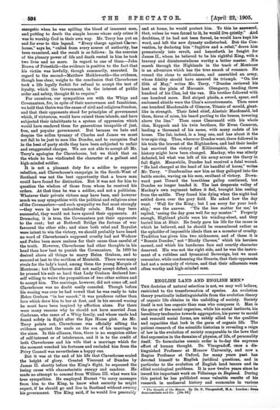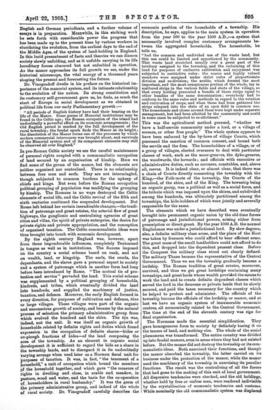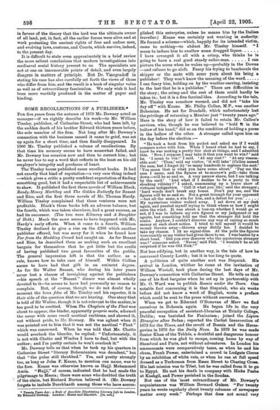ENGLISH LAND AND ENGLISH MEN.*
THE doctrine of natural selection is not, we may well believe, restricted to the transformation of species. An evolution theory practically indistinguishable from the evolution theory of organic life obtains in the unfolding of society. Society itself is not less organic than man who composes it. Man is the germ of the social organism, while his social instincts, his hereditary tendencies towards aggregation, his power to mould and remould social forms, are subtly allied to the qualities and capacities that lurk in the germ of organic life. The patient research of the scientific historian is revealing a reign of law in the evolution of society comparable to the laws that find expression in the domains of physics, of life, of personality itself. To formularise cosmic order is to-day the supreme effort of human thought. Dr. Vinogradoff, once a dis- tinguished Professor at Moscow University, and now a Regius Professor at Oxford, for many years past has devoted himself to English juridical questions, and in particular to the evolution of English land tenure and its allied sociological problems. It is now twelve years since he issued his important work on Villainage in England. During this period he has published some valuable results of his research in mediaeval history and economics in various • The Growth of the Manor. By Dr. P. Vinogradoff, ILA. • London : Swan Sonnenachein and Co. [10a. Ca] English and German periodicals, and a further volume of essays is in preparation. Meanwhile, in this striking work he seta forth with considerable power the progress that has been made up to the present time by various workers in elucidating the evolution, from the earliest days to the end of the Middle Ages, of the system of land-holding in England. In this lucid presentment of facts and theories we can discern society slowly unfolding, and as it unfolds carrying in its life hereditary forces obscured but not enfeebled in operation. As the manor approaches its full growth we see, under the historical microscope, the vital energy of a thousand years
shaping the present and forecasting the future.
Dr. Vinogradoff dwells in his preface on the historical im- portance of the manorial system, and its intimate relationship to the evolution of the nation. Its strong constitution and its customary self-government gave us, he feels, as much the start of Europe in social development as we obtained in political life from our early Parliamentary growth :—
"All periods of English history have had their bearing on the life of the Manor. Some germs of Manorial institutions may be found in the Celtic age ; the Roman occupation of the island had undoubtedly a powerful effect on its economic arrangements ; the Old English period is marked by the full development of the rural township; the feudal epoch finds the Manor at its height ; the dissolution of the Manor forms one of the processes by which modern commercial intercourse was brought about, and survivals of the Manorial system and of its component elements may still be observed all over England."
In pre-Roman Celtic society we see the careful maintenance of personal rights coupled with a communalistic occupation of land secured by an organisation of kinship. Here we find some of the germs of the manor, but the elements are iaeither organised nor centralised. There is no relationship between free men and serfs. They are not intermingled, though subjected to common burdens for the upkeep of chiefs and kings. But even before the Roman occupation political grouping of population was modifying the grouping by kinship. The Romans in no ways destroyed the Celtic elements of social life, and the Celtic revival of the fifth and sixth centuries continued the suspended development. But Rome left behind her certain ineradicable changes,—the tradi- tion of patronage and great estates, the arterial flow of great highways, the ganglionic and centralising agencies of great pities and villas, the spirit of private enterprise, the desire for private rights and private appropriation, and the conception of organised taxation. The Celtic communalistic ideas were thus brought into touch with economic development.
By the eighth century England was, however, apart from these imponderable influences, completely Teutonised in tongue as well as in institutions. The Saxons imposed on the country a social scheme based on rank, and not on wealth, land, or kingship. The earls, the ceorls, the dependants, and the slaves gave a personal aspect to society and a system of patronage which in another form had long
before been introduced by Rome. "The mutual tie of pro- tection and service" pervaded the land. This social scheme
was supplemented by a political grouping of households, kindreds, and tribes, which eventually divided the land into hundreds, and supplied the machinery of justice, taxation, and defence. Moreover, the early English formed in every direction, for purposes of cultivation and defence, tins or large villages. These villages were part of the organic and unconscious growth of society, and became by the natural
process of selection the primary administrative group from which evolved the hundred and the shire. The tin was,
indeed, not the unit. It was itself an organic growth of households related by definite rights and duties which found expression in the occupation of definite shares—hides or ox-plough fractions of hides—of the land composing the area of the township. As an element in organic social development it is sufficient to regard the hide as a share in the township lands, and to disregard it in its undoubtedly varying acreage when used later as a Norman fiscal unit for Purposes of taxation. It was, in fact, "the tenement of a loonsehold," a unit of occupation which bound the members pf the household together, and which gave "the measure of rights in dwelling and close, in arable and meadow, in pasture, wood and water, and the basis for the co-operation of householders in rural husbandry." It was the germ of the primary administrative group, and indeed of the whole of rural society. Dr. Vinogradoff carefully describes the economic position of the households of a township. His description, be says, applies to the main system in operation from the year 500 to the year 1500 £D.,—a system that necessarily involved complex customary arrangements be-
tween the aggregated households. The households, he tells us,
"had the common and undivided use of the waste land, but this use could be limited and apportioned by the community. This waste land stretched usually over a great part of the territory assigned to the township, and the reclaiming of this land for purposes of exclusive cultivation and enjoyment was subjected to restrictive rules : the scarce and highly valued meadows were assigned under strict rules of proportionate division and re-division ; the amble, which formed the most important, and the most conspicuous portion of the whole, lay in scattered strips in the various fields and shots of the village, so that every holding presented a bundle of these strips equal to other bundles of the same denomination ; everybody had to conform to the same rules and methods in regard to the rotation and cultivation of crops, and when these had been gathered the strips relapsed into the state of an open field in common uso. The homesteads and closes around them were kept under separate management, but had been allotted by the community and could in some cases be subjected to re-allotment."
This was the agricultural method pursued, "whether we have a half-servile community under a lord, or a village of socmen, or other free people.' The whole system appears to have been enforced by the by-laws of village Courts, which possessed the sanction of common consent, and bound both the servile and the free. The householders of a village, or of a group of villages, elected overseers to deal with particular classes of work, such as the moor-greaves, the dyke-greaves, the woodwards, the howards ; and officials with executive or administrative duties, such as coroners, constables, and, above all, reeves. It is indeed clear, or almost clear, that there was a chain of Courts directly connecting the township with the King,—the Folk-mote of the township, the Courts of the hundred, of the shire, and of the King. The township being an organic group, was a political as well as a social force, and the tribute which was imposed upon the shires, and subdivided among the hundreds, was ultimately partitioned among the townships, the hide-holders of which were jointly and severally responsible for the same.
The elements which we have described were eventually brought into permanent organic union by the old-time forces of patronage and jurisdictional powers, arising either from prescription or direct grant. By the year 1000 A.D. the normal Englishman was under a jurisdictional lord. By slow degrees, also, a definite military class arose, and the place of the Host was taken by freemen who could afford to bear efficient arms. The great mass of the small landholders could not afford to do this, and dropped into the dependent peasant class. Before the Conquest the military class stood out clearly defined. The military Thane became the representative of the Central Government. Thus we see the township gradually become a lordship. The Roman tradition of great estates, moreover, survived, and thus we get great lordships containing many townships, and great lords whose wealth provided the means to work the land and to create definite dependent classes which served the lord in the demesne or private lands that he slowly secured, and paid the taxes necessary for the country which he helped to protect and administer. The officials of the township became the officials of the lordship or manor, and at last we have an organic system of innumerable economic centres, all economically related to the Central Government. The time at the end of the eleventh century was ripe for final organisation.
The Normans made the essential simplification. They gave homogeneous form to society by definitely basing it on the tenure of land, and nothing else. The whole of the social phenomena was transformed. The entire country was divided up into feudal manors, even in areas where they had not existed before. But the manor did not destroy the township or its com- munalistic ideas. Both exercised their functions, and though the manor absorbed the township, the latter carried on its ,business under the protection of the manor, while the manor used the machinery of the township in exercising its peculiar functions. The result was the centralising of all the forces that had gone to the making of this unit of local government. All dispersive tendencies were checked, and the old holdings, whether held by free or ,unfree men, were rendered indiviaible by the crystallisation of economic tendencies and customs.
While nominally the old communalistic system was displaced
in favour of the theory that the lord was the ultimate owner of all land, yet, in fact, all the earlier forces were alive and at work protecting the ancient rights of free and unfree men, and evolving laws, customs, and Courts, which survive, indeed, to the present day.
It is difficult to state even approximately in a brief review the more salient conclusions that modern investigations into mediaeval social history present to us. The specialists are not at one on innumerable points of detail, and even largely disagree in matters of principle. But Dr. Vinogradoff in stating his case has also carefully set forth the views of those who differ from him, and the result is a book of singular value as well as of extraordinau fascination. We only wish it bad been more worthily produced in the matter of paper and binding.




































 Previous page
Previous page